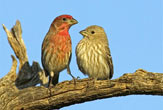One Bird’s Battle with Ugliness

Get the world’s most fascinating discoveries delivered straight to your inbox.
You are now subscribed
Your newsletter sign-up was successful
Want to add more newsletters?
Join the club
Get full access to premium articles, exclusive features and a growing list of member rewards.
Often in life, fate depends on which family one is born into. Baby finches with ugly fathers lose out on the good genes and get little food brought home by dad. So Mom has developed a clever coping strategy to compensate for this nutritional deficit, a new study finds.
Male house finches range from bright red to drab yellow. The color of their plumage is a result of dietary pigments called cartenoids, which are consumed in the wild. Coloring is therefore a good indicator of a male finch’s foraging abilities.
“The males that are better foragers are able to ingest more carotenoids, and thus their plumage is red,” said lead author Kristen Navara, a postdoctoral researcher at Ohio State University. Redder males have also been shown to feed females and offspring more, making them more attractive as potential fathers.
Because chicks that are sired by ugly fathers are not fed as much, they could suffer from nutritional deficit. Therefore, female house finches deposit more antioxidants, including 2.5 times more vitamin E, into the yolks of the eggs sired by unattractive males. This protects the embryo during the developmental process.
The antioxidants are thought to stimulate the immune system and protect against reactive atoms or molecules that can damage proteins in the body.
“We suggest that, because house finches are short-lived (they only survive to complete one to two breeding attempts), they are employing a compensatory strategy, where they attempt to beef up the low quality offspring and make the best of a bad situation,” Navara told LiveScience.
The study is detailed in the November/December issue of the journal Physiological and Biochemical Zoology.
Get the world’s most fascinating discoveries delivered straight to your inbox.
- Darwin's Finches Evolve Before Scientists' Eyes
- Colorful New Bird Discovered
- Images: Rare and Exotic Birds
- Secret of Bird Flight Revealed
 Live Science Plus
Live Science Plus











